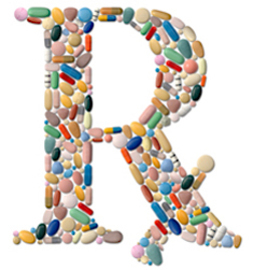The Effects and Mechanisms of Antibiotic Drugs

Some articles and textbooks use the terms antibiotics, antimicrobial and antibacterial interchangeably. However, there are subtle differences in meaning. Antibacterial and antimicrobial drugs are substances that prevent the growth and/or kill bacteria and other microorganisms. Antibiotics differ in the sense that it refers to substances produced by one type of microorganism that prevents the growth of or kills another.
Antibiotics do not act independently in eliminating bacteria. Oftentimes, the body’s natural defenses, surgery and dressing changes are required and are needed along with the administration of antibiotics.
The five mechanisms of antibiotic action are based upon the inhibition of bacterial growth or destruction of microorganisms. It works by: (1) preventing synthesis of bacterial cell wall, (2) inhibiting protein synthesis, (3) altering permeability of the membrane, (4) interfering with bacterial cell metabolism, and (5) preventing the synthesis of bacterial RNA and DNA.
Types of Antibiotics

Antibiotics are mainly categorized based on their mechanism of action, structure of chemicals or spectrum of action. Most of these drugs, however, target the functions and growth processes of the bacteria.
Other antibiotic drugs have bactericidal activities. Penicillin and cephalosporin target the bacteria’s cell wall. Drugs that work to impede essential bacterial enzymes are the sulfonamides and quinolones. Those that target the bacteria’s cell membrane are the polymixins.
Drugs that prevent the growth of a microorganism are what we call bacteriostatic drugs. Tertracyclines, macrolides, and aminoglycosides are the most common antibiotics under this class and they work to target protein synthesis.
Narrow-spectrum antibiotics are effective against a specific type of organism. For example, penicillin and erythromycin are primarily given to treat infections caused by gram-positive bacteria. On the other hand, broad-spectrum antibiotics are used to treat a wide range of infections. They work against both gram-positive and gram-negative bacteria, and they more commonly used when the causative agent has not yet been identified. Examples of this are cephalosporin and tetracycline.
Side-Effects and Adverse Reactions

When taking antibiotics, you may experience side-effects such as nausea, and gastrointestinal irritation such as stomach ache and diarrhea. Although they rarely occur when taking antibiotics, you should also watch out for photo sensitivity, abnormal blood clotting, and formation of kidney stones, among others.
In some cases, a person may develop more serious reactions to antibiotic drugs (especially when taking penicillin). There are three major adverse reactions to antibiotics. Allergy or hypersensitivity to the drugs may be mild or severe. Mild reactions include rash, hives, and pruritus. Severe reaction to the drugs may develop into anaphylactic shock and could be fatal. A person requires immediate medical support to avoid more fatal symptoms like vascular collapse and cardiac arrest.
Another adverse reaction is superinfection. It’s a secondary infection that usually occurs when the body’s normal flora are disturbed during antibiotic treatment; especially when using broad-spectrum antibiotics. Superinfection usually takes place in the skin, respiratory, gastrointestinal, and genitourinary systems.
Organ toxicity is another adverse reaction to antibiotics. The liver and kidneys are usually affected because they are responsible for metabolism and excretion of the drugs.
Helpful Reminders When Taking Antibiotics
Antibiotics don’t work against viruses! Colds, coughs and sore throats are usually caused by viruses, so it’s not advisable to take antibiotics. Use antibiotics only when it’s appropriate to do so. This stops the risk of developing resistance to the drugs. Use extra precaution and inform your physician if you are pregnant or lactating and/or if you have diminished kidney or liver function. Some chemicals and substances should not be taken with antibiotics because it may lessen the efficacy of the drug or may worsen your condition. Avoid combining alcohol with any medication. Inform your doctor if you’re taking other over-the-counter drugs, contraceptive pills, and herbal remedies. Keep all medicines out of the reach of children and store in a cool, dry place away from direct sunlight. Don’t forget to read labels before taking any medication. Take note of its expiry date. Do not remove from its original container. If you are scheduled for surgery or dental work, inform your health care provider about the medications you are currently taking.
Comments
Most Recent Articles
-
How Antibiotics Work
Antibiotics are a commonly prescribed type of drug. Broken up, antibiotics means “against life” in Greek. This of course means against the life of bacterial infections. Antibioti...
-
How Acne Scars Occur
If you are one of those people who are bothered by acne scars that have been there for years then read on and you might find a way to address it. Addressing the problem starts with understan...
-
Breast For Cancer Treatments
Breast cancer is a disease that consumes the lives of many women around the world. It is as dangerous and life threatening as any other type of cancer. Breast cancer starts in the inner lini...
-
Facilities That Give Mental Treatment
Finding a facility that helps patients treat their mental illnesses should not be difficult. Depending on the patient’s mental health disorder and the type of treatment he or she may n...
-
What Are The Causes Of Blackleg
Sheep are the most common target of blackleg disease, also known as Clostridium chauvoei. The blackleg disease was derived from the infected part of the sheep which is usually the leg, ...
-
Severity Of Breast Cancer
Although it can also affect men, breast cancer occurs predominately and is the most common type of cancer among women. It is a malignant tumor (a group of cancer cells) that originates from ...
-
Medical Programs For Aids Research
AIDS have been causing great alarm to people all over the world. Since the pandemic started in 1981 on AIDS there is no stopping people and countries to conduct studies and researches that a...
-
5 Most Common Genetics Diseases
There are diseases that are caused by bacteria, viruses, and other organisms that attack the body and are not defeated by the body’s antibodies. These diseases are mostly curable or tr...
-
How To Treat Nose Diseases
A person suffering from frostbite, broken nose, common cold, sinusitis and nasal polyps has a condition of diseases nose. Nose is a sensitive facial feature used to smell things and as a pas...
-
Where To Find New Suplements
It has become a part of the health programs for some people to include new suplements. Supplements have become an important part in keeping the body in great shape and health. People who are...
-
When Is An Illness Mental?
It is a health condition that affects the way a person thinks, behaves, and interacts with other people. Generally, it is accepted that it involves disturbance of thought, experiences, and e...
-
Diseases Circulatory Symptoms Help Diagnose
The circulatory system is responsible for supplying nutrients and oxygen to the human body cells and tissues. It is composed of the heart and blood vessels, including capillaries, arteries a...
-
How To Prevent Illneses
It is always important that people stay healthy all the time. When a person is not healthy, he is not able to do the things he wants and won’t be productive. Being unhealthy can be too...
-
How To Protect Yourself From Vcfs
There is a genetic condition which is somewhat related to DiGeorge syndrome in reference to the abnormality of the chromosome. This syndrome is known as Velo-cardio-facial syndrome, or VCFS,...
-
Critical Illness Life Information
The health of the person is very important that is why people are afraid of having a critical illness. Most critical illness life are hereditary, some are inborn, and some are by nature, no ...